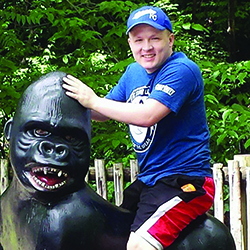Acute Lymphocytic Leukemia Survivor
Show Cancer Who’s Boss
 At 22 years old, Brandon Woods knew something was wrong when he couldn’t complete the drill exercises that were part of his weekend requirement for being in the National Guard. The fatigue became worse, and he struggled to breathe. His family rushed him to the hospital, and he was diagnosed with acute lymphocytic leukemia (ALL). He’s had several treatments and is grateful for the support he received. He is now focused on giving back and works to raise awareness about blood and stem cell donations.
At 22 years old, Brandon Woods knew something was wrong when he couldn’t complete the drill exercises that were part of his weekend requirement for being in the National Guard. The fatigue became worse, and he struggled to breathe. His family rushed him to the hospital, and he was diagnosed with acute lymphocytic leukemia (ALL). He’s had several treatments and is grateful for the support he received. He is now focused on giving back and works to raise awareness about blood and stem cell donations.
While I was in the National Guard, I had to go to my drill weekends, which is when reservists resume their military careers once a month. During my February 2016 drill weekend, I noticed I was struggling with exercising. I couldn’t do as many sit-ups or push-ups as normal. When I started my 2-mile run, I couldn’t run. I could only walk, and it was hard to breathe. I just thought I was tired.
Two weeks later, I noticed a grapefruit-sized bruise on my right leg, followed by one on my left leg. I developed another bruise from my elbow to my wrist on my right side. I also had blood in my nose. During spring break, I played pickleball but my teammates said I had no color in my face and that I looked like I was turning blue. When I went home, my aunt and uncle took one look at me and said they were taking me to the ER.
The first doctor I saw said my blood looked “leukemic.” Those words put me on edge. I was scared. I wanted answers yesterday. The doctor ordered a bone marrow biopsy that confirmed I had acute lymphocytic leukemia (ALL).
The doctors started treatment right away, and I spent the next month in the hospital. I received two different chemotherapies, rotated every few days for three months, as the doctors prepared me for a stem cell transplantation.
My brothers and sister were tested to see if one could be a donor. All of my siblings were a 50 percent match to me, but they were 100 percent matches to each other. Even so, my brother, Tyler, donated his stem cells, and I had an allogeneic transplant over the summer using his stem cells.
The chemotherapy caused me to lose my hair and eat a lot. I felt slow and sluggish. Basically, I slept and ate, and I struggled with nausea and vomiting. I did have a bit of Graft-vs-Host Disease, but it wasn’t too severe. One of the strangest side effects is the possibility of inheriting conditions from your donor. Tyler had eczema. I’d never had it before, but after the transplant, I started getting it.
Months later, testing showed some cancer had been destroyed, but the doctors wanted to see a better response. They planned for a second stem cell transplant as a preventive measure, but I decided not to get one so I could return to college.
In August 2017, I heard about CAR T-cell therapy being done at a university hospital for people under 25 with ALL. That spring, I asked my oncologist if I could try the treatment. I was enrolled in a clinical trial and received the CAR T-cell therapy later that spring. I spent nine days in the hospital after receiving it. I ran a fever and had the worst headache I’ve ever had, but I didn’t vomit or have other serious complications. The treatment became approved by the U.S. Food and Drug Administration shortly after my trial. Doctors will continue to monitor me, but they hope to see the treatment last for months and, hopefully, years.
Throughout all of this, I relied on my friends and family as well as the nurses and other staff that helped care for me. They were always a phone call or a button press away.
Because of the help and kindness I received, I want to give back and raise awareness for blood and bone marrow donations. I floated the idea for a bone marrow drive at the clinic during one of my checkups. They liked it and helped me work with Be the Match and the community blood center to set it up. The drive took place in the fall of 2018.
I know it’s a cliché, but even if the doctors tell you there’s a 1 percent chance of surviving, it’s still a chance at survival. Don’t give up. Reach out to people, don’t be afraid to ask questions, learn as much as you can about your cancer so you can make the most educated decisions, and remember — you are the boss of your treatment.


